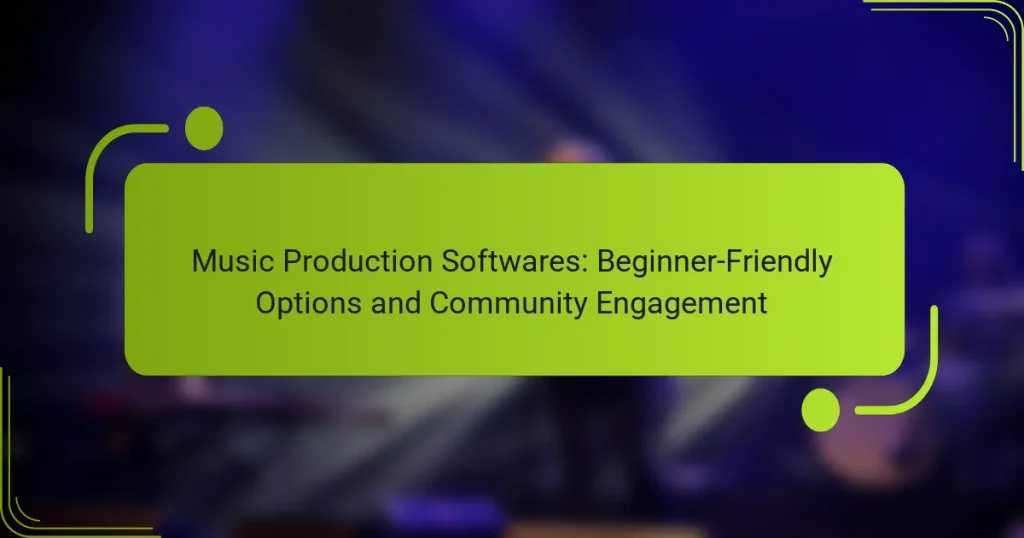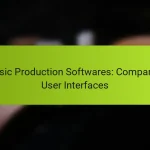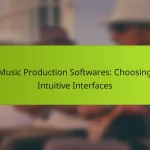For those venturing into music production, selecting beginner-friendly software is crucial for a smooth start. These programs not only feature intuitive interfaces and essential tools but also boast strong community support, enabling newcomers to learn and collaborate effectively. By exploring various options, producers can find the right fit that enhances their creativity and fosters connections within the music community.
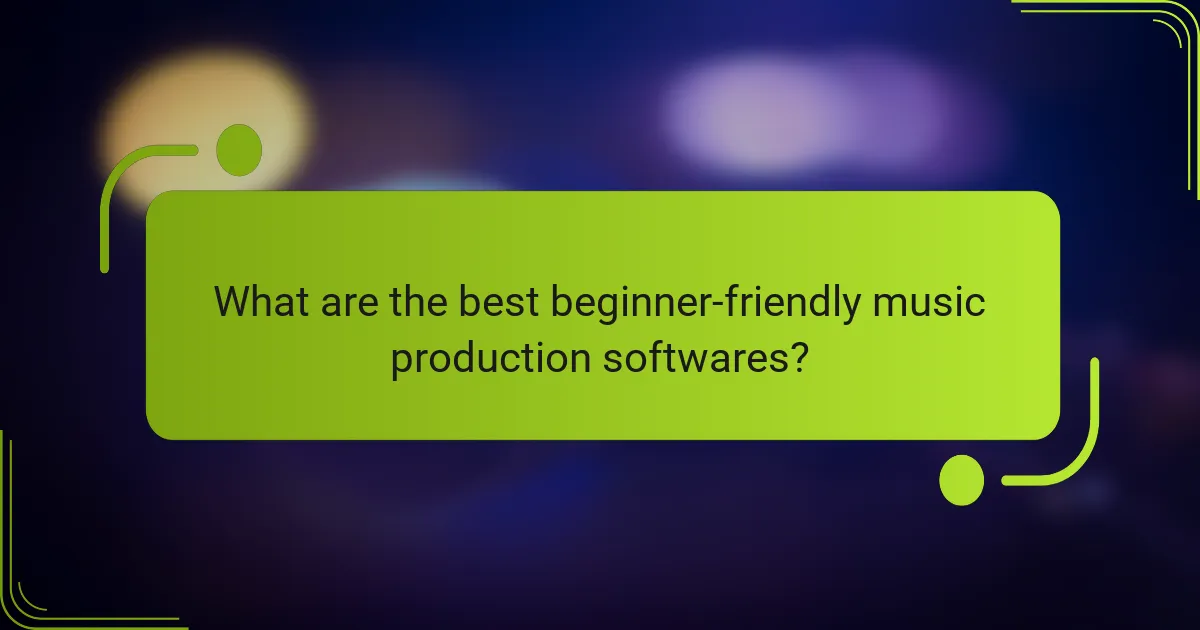
What are the best beginner-friendly music production softwares?
The best beginner-friendly music production softwares are those that offer intuitive interfaces, essential features, and strong community support. These tools help newcomers create music easily while providing resources for learning and collaboration.
GarageBand
GarageBand is a free music production software available exclusively for macOS and iOS users. It features a user-friendly interface and a variety of built-in instruments and loops, making it ideal for beginners to start creating music quickly.
Users can record live instruments, use virtual instruments, and apply effects with ease. GarageBand also offers a range of tutorials and resources, allowing new users to learn the basics of music production effectively.
FL Studio
FL Studio, known for its flexibility and powerful features, is a popular choice among beginners and professionals alike. Its step sequencer and piano roll make it easy to create beats and melodies, while the extensive library of samples and plugins provides ample creative options.
While FL Studio is a paid software, it offers a trial version with limited features. Beginners should consider starting with the Fruity Edition, which is more affordable and still provides essential tools for music creation.
Logic Pro X
Logic Pro X is an advanced music production software that builds on GarageBand’s features, making it suitable for those who want to progress in their music-making journey. It offers a vast array of virtual instruments, effects, and advanced editing capabilities.
Though it comes with a higher price tag, Logic Pro X is often seen as a worthwhile investment for serious beginners. Users can take advantage of its comprehensive tutorials and community forums to enhance their skills and knowledge.
BandLab
BandLab is a free, cloud-based music production platform that allows users to create, collaborate, and share music online. Its accessibility makes it an excellent choice for beginners who want to work on projects with others or access their work from different devices.
BandLab features a simple interface with essential tools for recording and mixing, as well as a library of loops and samples. The platform also includes social features, enabling users to connect with fellow musicians and receive feedback on their work.
Soundtrap
Soundtrap is another cloud-based music production software that caters to beginners with its easy-to-use interface and collaborative features. Users can create music directly in their web browser, making it accessible from any device with internet access.
Soundtrap offers a variety of virtual instruments, loops, and effects, along with built-in collaboration tools. This allows users to work with friends or other musicians in real-time, fostering a sense of community and shared learning.
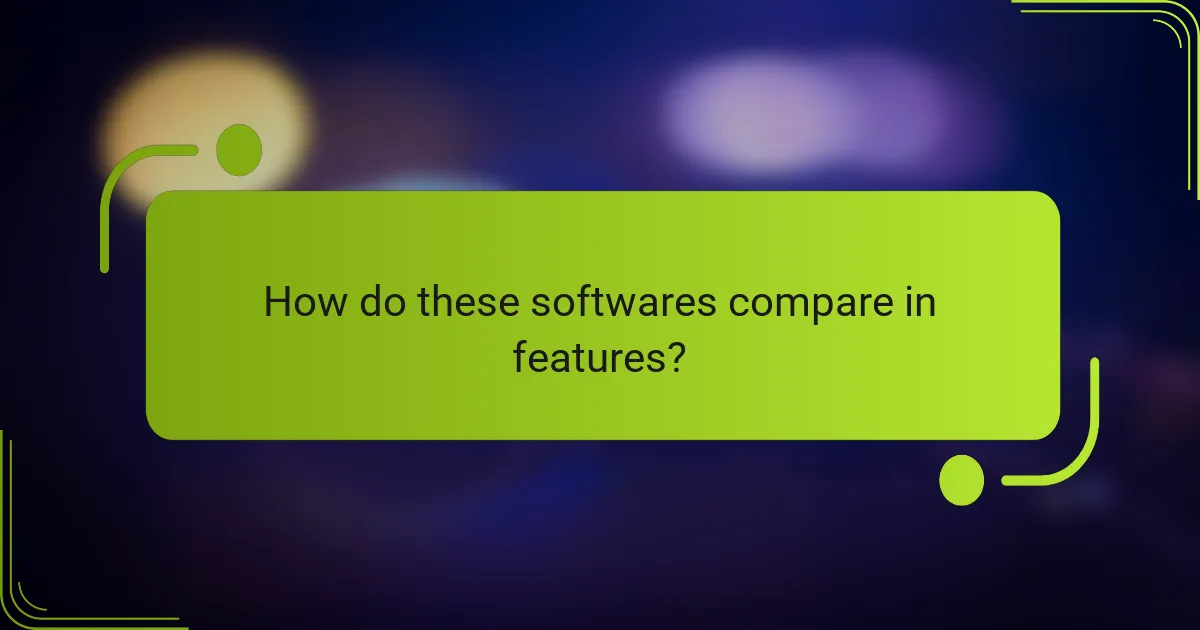
How do these softwares compare in features?
Beginner-friendly music production software varies significantly in features, affecting usability and creative potential. Key aspects to consider include audio editing capabilities, availability of virtual instruments, user interface design, and pricing models.
Audio editing capabilities
Audio editing is a crucial feature in music production software, allowing users to manipulate sound recordings effectively. Most beginner-friendly options offer basic editing tools such as cut, copy, paste, and fade effects, while some may include more advanced features like pitch correction and time stretching.
When comparing software, look for options that provide intuitive audio waveforms and visual editing tools. This can significantly enhance the editing experience, making it easier for beginners to learn and apply techniques.
Virtual instruments availability
The availability of virtual instruments can greatly influence a beginner’s music production experience. Many software options come with a range of built-in synthesizers, drum machines, and sampled instruments, which can help users create diverse sounds without needing additional purchases.
Consider software that offers a robust library of virtual instruments, as this can facilitate experimentation and creativity. Some platforms also support third-party plugins, expanding the range of sounds available to users.
User interface design
A user-friendly interface is essential for beginners, as it can simplify the learning curve associated with music production software. Look for software that features a clean layout, intuitive navigation, and easily accessible tools to enhance workflow.
Some programs offer customizable interfaces, allowing users to arrange tools according to their preferences. This flexibility can help beginners focus on their creative process without getting overwhelmed by complex menus and options.
Pricing models
Pricing models for music production software can vary widely, from free versions with limited features to premium subscriptions or one-time purchases. Beginners should consider their budget and the value offered by each software option.
Many popular choices provide a free trial or a basic version, allowing users to explore features before committing financially. It’s advisable to compare the long-term costs of subscription services versus one-time purchases to find the best fit for your needs.
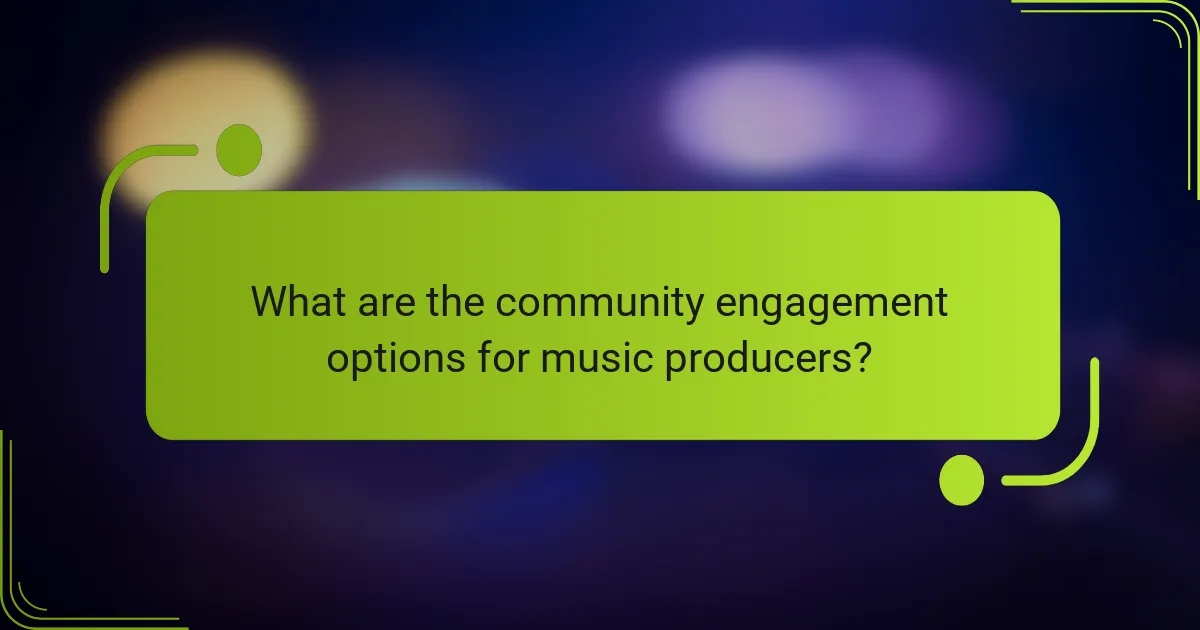
What are the community engagement options for music producers?
Music producers have various community engagement options that enhance collaboration, learning, and networking. These platforms allow producers to connect with peers, share knowledge, and participate in creative projects.
Online forums and groups
Online forums and groups serve as dedicated spaces for music producers to discuss techniques, share experiences, and seek advice. Popular platforms like Gearslutz, Reddit’s r/WeAreTheMusicMakers, and KVR Audio provide a wealth of resources and a community of like-minded individuals.
When participating, be sure to follow community guidelines and contribute positively to discussions. Engaging regularly can help build your reputation and expand your network.
Social media platforms
Social media platforms, such as Facebook, Instagram, and Twitter, offer vibrant communities for music producers. You can join specific groups or follow hashtags related to music production to stay updated on trends and connect with others.
Utilize these platforms to share your work, seek feedback, and engage with fellow producers. Regular interaction can lead to collaborations and increased visibility for your projects.
Collaborative projects
Collaborative projects allow music producers to work together on tracks, remixes, or other creative endeavors. Platforms like Splice and Kompoz facilitate collaboration by providing tools for sharing files and ideas.
Consider reaching out to other producers whose work you admire. Establish clear communication and set expectations to ensure a smooth collaboration process.
Workshops and webinars
Workshops and webinars are excellent opportunities for music producers to learn new skills and techniques. Many organizations and platforms, such as MasterClass and Skillshare, offer courses led by industry professionals.
Participating in these events can enhance your knowledge and help you stay current with industry trends. Look for local events or online sessions that fit your schedule and interests.
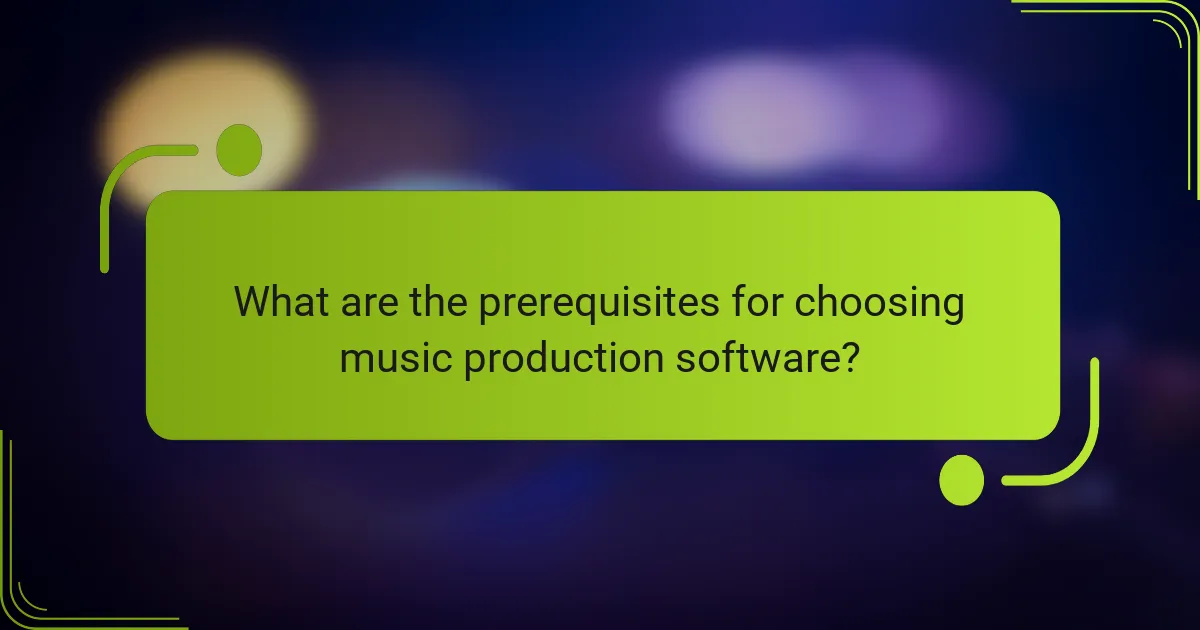
What are the prerequisites for choosing music production software?
When selecting music production software, it’s essential to consider your skill level and budget. These factors will significantly influence your choice, ensuring the software aligns with your capabilities and financial resources.
Skill level assessment
Assessing your skill level is crucial when choosing music production software. Beginners may benefit from user-friendly interfaces and simplified features, while more experienced users might seek advanced functionalities and customization options. Consider whether you are a complete novice, have some experience, or are an advanced user.
For beginners, software like GarageBand or FL Studio offers intuitive designs and tutorials, making the learning curve manageable. Intermediate users might prefer Ableton Live or Logic Pro, which provide more complex tools without overwhelming new users.
Budget considerations
Your budget plays a significant role in selecting music production software. Prices can range from free options to several hundred dollars for professional-grade software. Determine how much you are willing to invest, keeping in mind that some software offers free trials or tiered pricing.
For instance, free software like Audacity is great for those just starting, while paid options like Pro Tools or Cubase can cost between $200 and $600, depending on the version and features. Always check for student discounts or promotional offers that can reduce costs.
